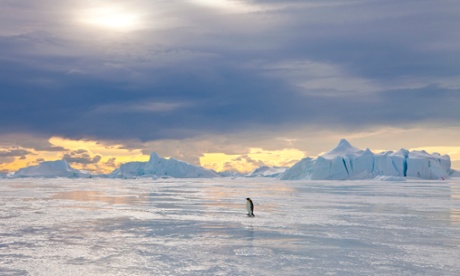
When European explorers set out to find a land in the southern hemisphere speculated about since the Roman empire, they did not expect to find anything beyond the mostly arid continent of Australia. In 1820, however, a vast terrain with deserts of ice was spotted by a Russian expedition, and by the following year, the original Terra Australis (Southern Land) had its first documented human landing.
Australia and Antarctica have since had a close relationship, the former having the largest territorial claim over the latter. It is fitting, then, that Favel Parrett, author of When the Night Comes, explores the relationship between these lands by pairing two characters, both as different and similar as the islands that bear them. The desert-like nature of the two continents is only the first thing the protagonists have in common. Both Isla, a young girl living in Tasmania, and Bo, a cook on the Antarctica supply ship Nella Dan are isolated from the larger world, laconically reflecting the environment around them.
In Hobart, Isla and her brother start studies at a Quaker school, where, in the grand tradition of an 80s childhood, they collect 20c coins for hot dogs and watch movies like Beat Street. Parrett is always sensitive towards the relationships between brothers and sisters, and this novel is filled with moments of bonding between the siblings.
On the Nella Dan, Bo travels between Hobart, Antarctica and his base in Denmark. There are some illuminating descriptions of life on the boat, presumably inspired by Parrett’s Australian Antarctic Arts Fellowship, used as research for her novel: the delight in an apple after a long time at sea, the counting down of beers, the endless repetition of days. “There are just tasks. Simple tasks. Sleep. Make coffee … sleep, then tasks,” Bo notes.
But ultimately, life on the boat is an isolating experience. After the accidental death of a shipmate, Soren, his body is kept in the freezer with the cabbages, cauliflowers, grapefruits, carrots and potatoes, and remains as a daily reminder of the fragility of life.
Parrett writes with simple prose, at times using a nursery rhyme-like repetition. As a result the two protagonists ponder the world and the things around them with simplicity. “That was how I grew up – on my island you knew most of the people nearby, and they knew you and you trusted what they said,” Bo says of his childhood, and similarly, Isla’s life in Hobart is fiercely protected.
This comes at a sacrifice to the characters’ inner lives. For example, we know little about the relationship between Isla’s mother and Bo, other than they are most likely in a romance. Likewise, while the relationship between Bo and Isla is paternal, with Bo teaching Isla things like how to crack open walnuts to find their “little brains”, or taking her on the boat for cooking demonstrations, their feelings about events outside their immediate lives remain opaque to the reader. A darker backstory around Isla’s mother is hinted at, but not explored.
But deep, brooding analyses of human nature are not Parrett’s bag. Parrett’s first novel, Past the Shallows, was shortlisted for the Miles Franklin award in 2012, and placed her young protagonist Harry in a coastal, coming-of-age narrative. Parrett’s strengths arise largely from describing physical sensations, such as the experience of catching a wave, or of walking across Antarctic snow for the first time. Like the landscapes around her, her characters neither analyse nor define, but instead ask us to simply marvel at our own surroundings in awe.

